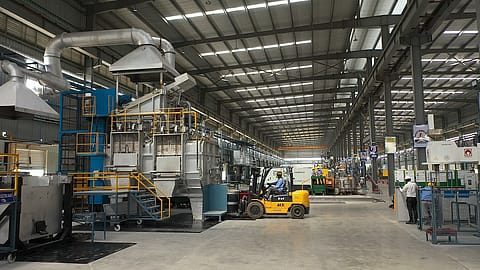India’s manufacturing PMI expands to 57 in Nov; input cost inflation slips to 40-month low
According to S&P Global, a key feature of the latest results was a substantial easing of price pressures.

The country's Purchasing Manufacturing Index (PMI) for November expanded to 56 in November as against 55 in October, driven by strengthening client demand, boost in production volume, and decline in input cost, according to S&P Global. A reading above 50 indicates an overall increase in factory output.
The input cost inflation slipped to a 40-month low as inflationary pressures retreated with purchase costs rising at the weakest pace since the current sequence of increases began in August 2020, as per the research firm.
According to S&P Global, a key feature of the latest results was a substantial easing of price pressures.
"India's manufacturing industry maintained its robust performance in November, with output regaining growth momentum. Firms’ ability to secure new business, both domestically and from abroad, remained central to the success of the sector. Sustained new order growth continued to be good news for the sector’s labour market, with recruitment remaining on an upward path. Expanded capacities, rising workloads and the need to replenish stocks of finished goods collectively indicated that India's manufacturing economy is clearly in good shape as 2023 draws to a close, with expectations for a continued strong performance in 2024," says Pollyanna De Lima, Economics Associate Director at S&P Global Market Intelligence.
"Prices for raw materials and components still rose in November, but improved availability at suppliers amid subdued global demand for inputs led to a considerable retreat in cost pressures. Some concerns over prices increasing in the near-term were reflected in the data for business sentiment, but there was also a softer uptick in output charges amid a reduced inflationary environment," she adds.
In terms of exports, according to S&P Global, new orders rose for the twentieth month in a row and solidly, albeit at the slowest rate since June. "On the upside, companies signalled higher intakes of new business from Africa, Asia, Europe and the US," the research firm says.
Meanwhile, with the total new sales continued to witness a surge during the month under review, demand conditions remained positive, input supply relatively improved, and the domestic manufacturers scaled up production volumes. Output expanded sharply and at an above-trend pace, the research firm says.
Recommended Stories
According to the research firm, manufacturing employment continued to gain momentum for the eighth successive month of 2023. "New work in the pipeline and a healthy demand environment spurred recruitment, anecdotal evidence showed. Growth ticked higher, but was moderate overall," the research firm says.
"The outlook for India's manufacturing sector remained favourable in November, with firms seeing opportunities in the form of demand strength, marketing initiatives and new clients making enquiries about a wide range of products. That said, the overall level of positive sentiment slipped to a seven-month low amid rising inflation expectations," it adds.